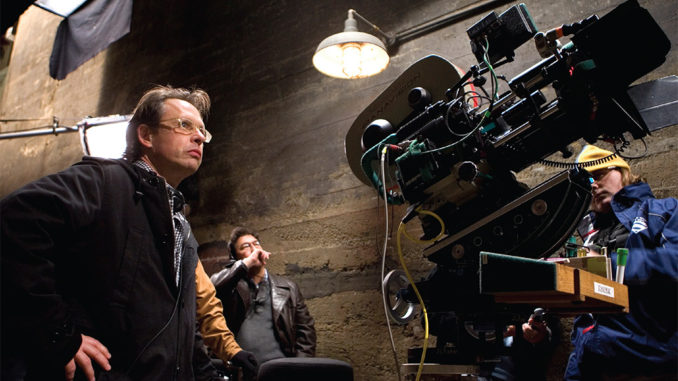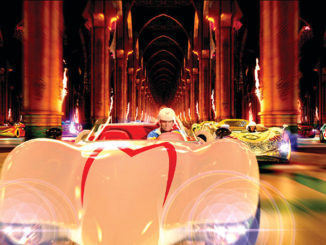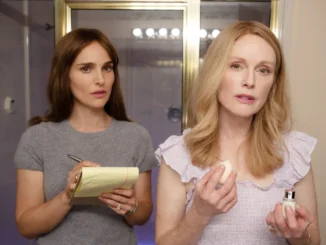
by Rachel Igel
While overseeing the mix of Dreamgirls at Todd-AO West in Santa Monica, California, writer/director Bill Condon spoke with CineMontage. His intelligence, quick intellect, and enthusiasm for the work he so clearly loves were much in evidence throughout the interview.
CineMontage: You’ve directed and/or written some of the most intriguing and provocative films of recent years: Kinsey, Gods and Monsters, Chicago, and now Dream-girls. What elements about the story and the characters attract you to the projects you choose?
Bill Condon: I think I have a connection to people on the outside of society who are trying to break down barriers. That really runs through all of the films you mentioned, though I’m not sure I’m always conscious of it when I choose my projects. I also think I’m very drawn to characters who are overtly theatrical in some way. It’s very useful for movies, because these characters are innately self-dramatizing.
CM: Many of your films deal with the monster without and within. Alfred Kinsey was a flawed human being, but he was trying to do something that had never been done before––which was to bring human sexuality out into the open. Do you think he failed?
BC: I think in some ways he failed and in some amazing ways he succeeded. There’s no question there’s a direct line from Kinsey to the sexual revolution of the ‘60s. Certainly his interest in women’s sexuality laid the groundwork for a lot of what happened later. So in those big ways he succeeded. But there was some failing in being able to successfully punch through the essentially puritanical nature of our country. He was personally defeated by that.
“Post is purely pleasurable to me. It’s a chance to get back to the writing process.” – Bill Condon
CM: It’s interesting that his first book on male sexuality was very successful, but his book on female sexuality was not. Why do you think that was?
BC: One reason was that the Cold War was really taking root. There was a sense of paranoia in the country, with everything being seen through the prism of the fight against Communism…and therefore, a kind of defense of family values. That’s our contemporary phrase, but their version of it became so important. Also, it’s one thing to say what men were up to, because everyone knows men are dogs. But when you start saying that your grandmother and your sister are masturbating and having sex––and having sex with each other––that is just too threatening an idea.
CM: What was the appeal of Dream-girls?
BC: I loved the show, but it opened at a time when musical movies were going out of fashion. Dreamgirls was probably the big one that got away. So when Chicago and Moulin Rouge ushered in this new spate of musicals, I thought, “That’s the one I want to make.” I always thought it had an amazing story and that there was a reason to tell it now. The passage of time allows you to put it into an historical context, and see how remarkable this cultural change was. It’s one that we’re still playing out today.
CM: It must have been challenging to direct so many big production numbers.
BC: It was. When you compare it to Chicago, which had so few, this is almost like an opera. You cannot do what you were able to do in the golden age––which is simply stop for someone who can sing or dance wonderfully for three minutes. I don’t think an audience today will accept that. A story has to be woven through every song so that you never stop.
“I have a connection to people on the outside of society who are trying to break down barriers.” – Bill Condon
CM: There are many important characters in the film. How did you keep a balance between all the separate stories?
BC: That was a challenge in writing and editing the film. There are six main characters being followed over 15 years, and you’ve got to keep those balls up in the air all the time. You make a seven-year cut, and before you even know that two of the characters are married, you know the marriage is in trouble. You’ve got to give the information out very quickly––and be brutal about anything that doesn’t do that.
CM: You also did something that was very clever. These characters live in very artificial surroundings, which could have been a hindrance in the sense that the film would look stagy or theatrical. But it feels very real. We believe that these people live in that environment, sequestered from the real world.
BC: That’s exactly right! And that allows you to do theatrical things because of that environment. For example, you take a number, which, let’s face it, is an artificial number. It’s someone singing her emotions to somebody. When you put it on a stage, you’re reminded that these are theatre folk. In the show, that took place in a dressing room. But it didn’t really; it took place on a stage! So you just commit to the idea that that’s where it takes place in the movie.
CM: What part of filmmaking do you enjoy the most?
BC: I’ve enjoyed sections of each part of the process. I’d say most of post to me is purely pleasurable. It’s a chance to get back to the writing process and it’s an intensely creative and fun experience.
“The passage of time allows you to put [Dreamgirls] into an historical context, and see how remarkable this cultural change was.” – Bill Condon
CM: You’ve had a very long relationship with your editor Ginny Katz. What is it like to work with someone you know so well?
BC: That just adds so much to the process. There’s such a trust and a kind of shared vision between the two of us, so that if she feels that extra percent strongly about something, I feel that she’s right. And she feels the same way about me. That’s one of the things that just happens over time.
CM: Do you look at dailies together?
BC: We look at dailies but don’t talk much. Sometimes I’ll have notes but she usually doesn’t read them. Sometimes I accuse her of not reading the script either [laughs], but of course that’s not true. What is great is that she just looks at the film and she lets the film speak to her. And sometimes, if she’s not looking at the script too much, I think that’s great too. On a weekend, when I get to look at what she’s cut while we were shooting––the reward for all that hard work––I’ll think, “Oh my God, I never would have thought of that.” That’s one of the great joys of working with her.
I’d also like to say that actors have gotten a certain amount of attention on the movies I’ve worked on, and that has a lot to do with her. It’s amazing to me that she will find the gem of a moment in a performance. I can’t tell you in how many of these movies are these discoveries. They are there in the first, quick pass, and they stay in the movie.
CM: Who are the filmmakers you admire and how have they influenced your work?
BC: It’s such a long list, you almost can’t begin to name them all. In this film it was [Vincente] Minnelli and [Otto] Preminger. The Preminger mise en scène is always inspiring. Minnelli’s use of color, obviously. Also Stanley Donen. I think people will recognize moments [in Dreamgirls] from Funny Face. And George Cukor, the A Star is Born period. But I wouldn’t say that they’re necessarily my favorite directors. They are among my favorites, but I just love films of all kinds and so many directors currently inspire me. I can’t get enough of Almodóvar, Ang Lee, Stephen Frears. I’m just a fan, first and foremost.




